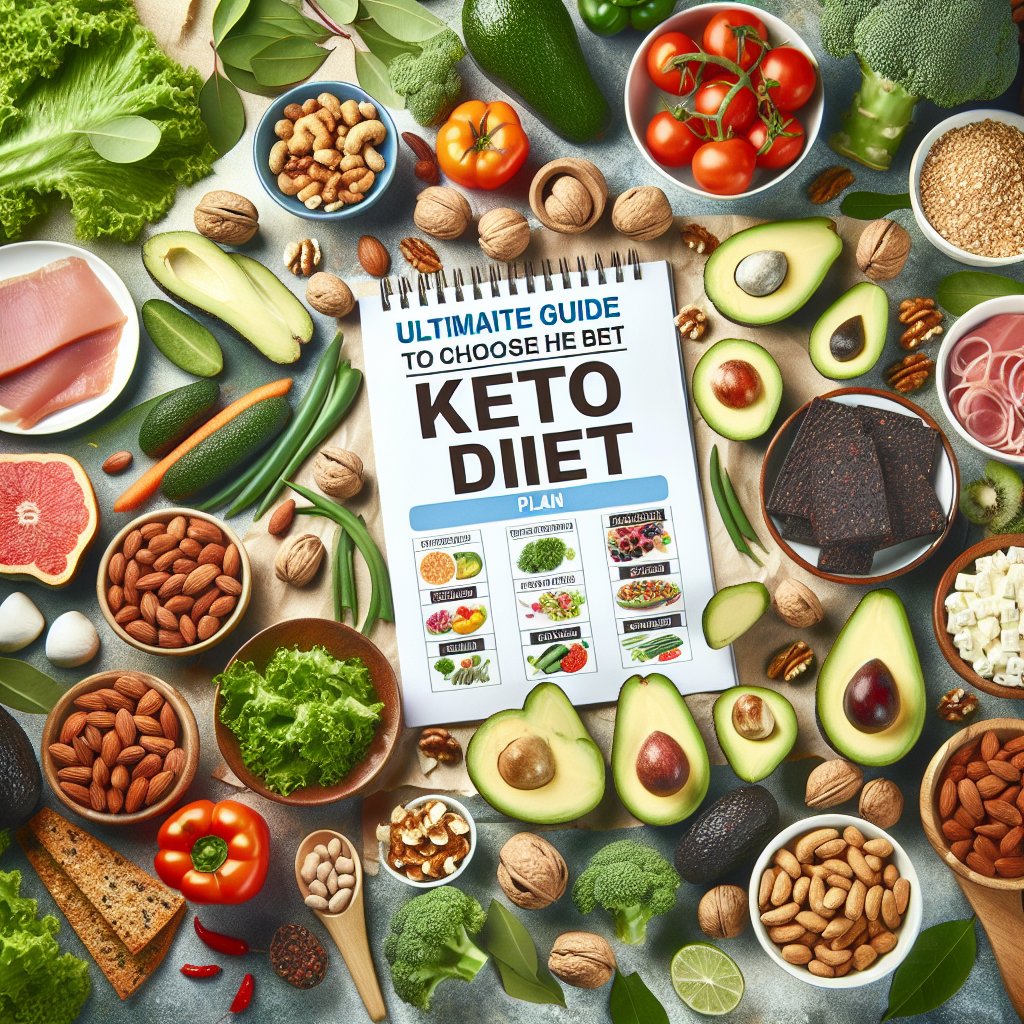Ultimate Guide to Choosing the Best Keto Diet Plan for Optimal Results: Expert Insights and Comparison
Why is the Keto Diet So Popular?
Before we dive into the nitty-gritty of choosing the best keto diet plan, let’s first explore why the keto diet has become such a sensation in recent years. The ketogenic diet, or keto diet, has gained immense popularity due to its remarkable effectiveness in weight loss and overall health improvement. The diet focuses on consuming high-fat, adequate-protein, and low-carbohydrate foods, which induces a metabolic state called ketosis.
Research has shown that the keto diet not only aids in weight loss, but it also offers numerous health benefits, including improved heart health, better blood sugar control, increased mental clarity, and enhanced energy levels.
Moreover, the keto diet has gained a large following due to its flexibility and variety. With a wide range of delicious and satiating foods such as avocados, nuts, olive oil, and fatty fish, adherents of the keto diet can enjoy a diverse and satisfying meal plan.
As the popularity of the keto diet continues to soar, it’s crucial to understand that not all keto diet plans are created equal. Choosing the best keto diet plan is imperative to achieve optimal results and ensure that the dietary approach aligns with your lifestyle and goals.

What is the Keto Diet?
If you’re considering the idea of starting a keto diet plan, it’s essential to understand the fundamental principles behind it. The ketogenic diet, often referred to as the keto diet, is a high-fat, low-carbohydrate eating plan. The primary goal is to induce a state of ketosis within the body.
Ketosis is a natural metabolic state where the body efficiently burns fat for fuel instead of carbohydrates. When carb intake is significantly reduced, the liver produces ketones from the breakdown of fats. These ketones become the body’s primary source of energy, leading to weight loss and various other health benefits.
The keto diet typically consists of consuming high amounts of healthy fats, moderate protein, and very few carbohydrates. This shift in macronutrient intake helps control blood sugar levels and insulin resistance, contributing to improved weight management and overall well-being.
Research has shown that the keto diet can be highly effective for weight loss, improving cardiovascular health, boosting mental clarity, and even managing certain medical conditions like epilepsy and type 2 diabetes. Its impact on blood sugar levels and insulin sensitivity makes it a compelling option for those looking to regulate their metabolism and energy levels.
Benefits of the Keto Diet
So, you’ve heard about the ketogenic (keto) diet and its miraculous effects, but what exactly are the health benefits of following this popular eating plan? Let’s dive in!
First and foremost, the keto diet has been widely praised for its ability to promote weight loss. Research published in the Journal of Clinical Endocrinology & Metabolism has shown that following a keto diet can lead to significantly greater weight loss compared to a low-fat diet. This is because the high-fat, adequate-protein, and low-carbohydrate composition of the keto diet can help suppress appetite and boost metabolism.
Moreover, many people find that the keto diet helps improve their overall energy levels. When the body enters a state of ketosis, it becomes incredibly efficient at burning fat for energy. This metabolic shift can lead to a more consistent and sustained energy supply throughout the day, as documented in a study from the Journal of Physiology & Behavior.
In addition to weight loss and increased energy, the keto diet has also been linked to improved mental focus and clarity. This is due to the steady supply of fuel to the brain from ketones, which are produced during ketosis. Research in the Journal of Neurobiology suggests that the ketogenic diet may have neuroprotective benefits and could potentially help with conditions such as Alzheimer’s disease.
Furthermore, following a keto diet can lead to better blood sugar control and reduced risk of type 2 diabetes. A study in the American Journal of Clinical Nutrition found that the keto diet can improve insulin sensitivity and lower blood sugar levels, making it a valuable dietary approach for individuals with diabetes or those at risk of developing the condition.
Overall, the health benefits of following a keto diet are vast and diverse, ranging from weight loss and increased energy to enhanced mental focus and improved blood sugar control.

Types of Keto Diet Plans
When it comes to the ketogenic diet, there isn’t a one-size-fits-all approach. Different variations of the keto diet have emerged to cater to individual preferences, lifestyles, and fitness goals. Let’s explore the various types of keto diet plans to help you choose the best one for optimal results.
Standard Keto
The standard keto diet, also known as the strict keto diet, is the most common and well-researched version. It typically consists of consuming 75% fat, 20% protein, and 5% carbs. By severely limiting carbohydrate intake, the body enters a state of ketosis, where it burns fat for fuel instead of glucose. This can lead to rapid weight loss and improved mental clarity.
Targeted Keto
Targeted keto is a modified version that allows individuals to consume a small amount of fast-acting carbs around their workouts. This approach is popular among athletes and fitness enthusiasts who require an extra energy boost for high-intensity training. By strategically timing carb intake, they can optimize performance without sacrificing the benefits of ketosis.
Cyclical Keto
Cyclical keto involves alternating periods of standard keto with short-term, higher-carb refeeds. Typically, individuals follow a strict keto diet for five to six days and then increase their carb intake for one to two days. This carb cycling is believed to prevent metabolic slowdown, replenish glycogen stores, and provide a psychological break from strict dieting, making it sustainable for some individuals.
High-Protein Keto
High-protein keto is similar to the standard keto diet but with a greater emphasis on protein consumption. This variation may be beneficial for individuals aiming to preserve or build muscle mass while still reaping the metabolic benefits of ketosis. A high-protein keto diet typically consists of 60% fat, 35% protein, and 5% carbs. However, it’s important to note that excessive protein intake may hinder ketosis in some people.
Each type of keto diet plan has its unique characteristics and potential benefits, and the best one for you depends on your health goals, lifestyle, and individual response to dietary changes. It’s essential to consult with a healthcare professional or a registered dietitian before making significant dietary adjustments, especially if you have any underlying health conditions.
Factors to Consider when Choosing the Best Keto Diet Plan
So, you’ve decided to take the plunge into the world of the ketogenic diet. Congratulations on making this exciting decision! As you prepare to embark on this journey, it’s essential to consider several key factors that will help you select the best keto diet plan for your unique needs and circumstances.
Personal Goals
First and foremost, it’s crucial to define your personal goals and expectations for following a keto diet plan. Are you looking to lose weight, improve your overall health, increase your energy levels, or simply maintain a more balanced approach to eating? By identifying your specific objectives, you can tailor your keto plan to align with these goals, ensuring that it serves as an effective tool to support your desired outcomes.
Lifestyle
Another vital factor to consider is your lifestyle. Are you a busy professional with limited time for meal preparation, or do you have the flexibility to dedicate more time to cooking and experimenting with recipes? Understanding how the keto diet will fit into your daily routine is essential for selecting a plan that is practical and sustainable for your lifestyle. Whether you’re a culinary enthusiast or someone who prefers quick and easy meals, there are keto diet plans available to suit every lifestyle.
Health Conditions
Additionally, it’s important to take into account any existing health conditions or dietary restrictions you may have. If you have specific medical concerns, such as diabetes, heart disease, or food allergies, consulting with a healthcare professional or a registered dietitian is highly recommended. They can provide valuable insights and guidance to help you choose a keto diet plan that supports your overall health while addressing any specific conditions or nutritional needs.
When considering health conditions, research has shown that the ketogenic diet can have potential benefits for individuals with certain health issues. According to a study published in the Journal of the American College of Cardiology, the ketogenic diet may lead to improvements in cardiovascular risk factors, making it a viable option for individuals with heart health concerns. However, it’s essential to approach any dietary changes with careful consideration of your individual health circumstances.
By carefully evaluating these key factors – personal goals, lifestyle, and health conditions – you can make an informed decision when selecting the best keto diet plan that aligns with your needs and sets you up for success on your ketogenic journey.

Comparison of Top Keto Diet Plans
So you’ve decided to embrace the keto lifestyle, but with so many diet plans out there, how do you choose the best one for you? Let’s take a closer look at some popular keto diet plans and compare them with the standard keto diet to help you make an informed decision.
Standard Keto Diet
The standard ketogenic diet, often referred to as the “keto diet,” is a high-fat, low-carbohydrate diet designed to shift the body’s metabolism away from glucose and towards fat utilization and ketone production. It typically involves consuming 70-75% of calories from fat, 20-25% from protein, and 5-10% from carbohydrates.
Atkins Diet
The Atkins Diet is another low-carb, high-fat diet that shares some similarities with the keto diet. It also emphasizes restricting carbohydrates while encouraging the consumption of healthy fats and protein. However, the Atkins Diet has different phases, with the initial phase being more restrictive in carbohydrate intake compared to the standard keto diet. As the diet progresses, individuals gradually increase their carb intake.
Paleo Diet
The Paleo Diet, also known as the “caveman diet,” focuses on consuming foods that were available to our ancient ancestors, such as lean meats, fish, fruits, vegetables, nuts, and seeds. While the Paleo Diet restricts processed foods and grains, it does allow for a higher carbohydrate intake from fruits and some starchy vegetables compared to the standard keto diet.
Mediterranean Diet
The Mediterranean Diet is renowned for its emphasis on heart-healthy fats, lean proteins, and abundant plant-based foods. It promotes the consumption of olive oil, nuts, seeds, fish, fruits, vegetables, and whole grains. While the Mediterranean Diet is not inherently low-carb, it can be adapted to fit a keto framework by limiting the intake of grains and certain fruits.
When comparing these popular keto diet plans with the standard keto diet, it’s essential to consider the macronutrient ratios, food choices, and overall approach to dietary patterns.
While the Atkins Diet and the standard keto diet share similar macronutrient profiles, the Atkins Diet’s phased approach to carb restriction may not provide the same level of ketogenic metabolic adaptation as the standard keto diet.
On the other hand, the Paleo Diet and Mediterranean Diet, while offering potential health benefits, may not align completely with the macronutrient ratios of the standard keto diet due to higher allowable carbohydrate intake from certain sources.
Ultimately, the best keto diet plan for you depends on your individual health goals, preferences, and metabolic response to different dietary approaches. It’s essential to experiment with different options and find the one that aligns best with your lifestyle and yields optimal results.
Expert Recommendations: Selecting the Best Keto Diet Plan
When it comes to selecting the best keto diet plan, it’s always beneficial to seek insights from nutritionists and dietitians who have in-depth knowledge about the ketogenic diet. Let’s delve into the expert recommendations to help you make an informed decision.
Understanding Individual Needs
Nutritionists and dietitians emphasize the importance of understanding individual needs when choosing a keto diet plan. Every person’s body is different, and what works for one individual may not work for another. Factors such as age, activity level, metabolic rate, and any underlying health conditions play a crucial role in determining the most suitable keto plan.
According to The Journal of Nutrition, a personalized approach to the keto diet based on individual needs can lead to better adherence and improved outcomes.
Assessment of Macronutrient Ratios
Experts suggest that the ideal keto diet plan should involve a well-balanced distribution of macronutrients, primarily fats, protein, and carbohydrates. While the standard ketogenic diet typically consists of 70-75% fats, 20-25% protein, and 5-10% carbohydrates, variations in these ratios might be recommended based on an individual’s requirements.
A study published in The American Journal of Clinical Nutrition indicates that personalized macronutrient ratios in a keto diet can lead to greater fat loss and preservation of lean body mass compared to a standardized approach.
Focusing on Nutrient-Dense Foods
Nutritionists stress the significance of choosing nutrient-dense foods within a keto diet plan. A variety of non-starchy vegetables, healthy fats, and high-quality proteins should be prioritized to ensure an adequate intake of essential vitamins, minerals, and antioxidants.
Research in the European Journal of Nutrition highlights that a well-formulated ketogenic diet rich in nutrient-dense foods can provide various health benefits, including improved lipid profiles and better overall metabolic health.
Considering Sustainability and Long-Term Adherence
Long-term adherence to the chosen keto diet plan is paramount for achieving sustainable results. Dietitians recommend selecting a plan that aligns with your lifestyle, food preferences, and cultural considerations, making it more likely for you to stick with the program in the long run.
A review in the Journal of the Academy of Nutrition and Dietetics suggests that adherence to a keto diet plan over the long term is associated with better weight loss maintenance and metabolic improvements.
By considering these expert recommendations, you can confidently select the best keto diet plan tailored to your specific needs and preferences, setting yourself up for optimal results and long-term success.

Success Tips for Following a Keto Diet Plan
Embarking on a ketogenic diet plan can be a game-changer for your health and well-being. However, the key to success lies in adopting the right strategies to ensure you stay on track. Here are some essential tips to help you thrive on your keto journey:
Meal Planning
One of the most valuable tools for success on a keto diet is thoughtful meal planning. By taking the time to plan your meals in advance, you can ensure that you always have delicious and satisfying options that align with your dietary goals. Start by researching keto-friendly recipes and creating a weekly meal plan that incorporates a balance of healthy fats, adequate protein, and minimal carbs. This proactive approach will not only save you time and money but also help you resist the temptation of convenience foods that may not be keto-friendly.
Tracking Macros
Tracking macronutrients, specifically the intake of carbohydrates, protein, and fat, is crucial for maintaining a state of ketosis. Utilize food tracking apps or journals to monitor your daily macro intake and ensure that you are staying within the recommended keto macronutrient ratios. By keeping a close eye on your macros, you can fine-tune your diet to optimize your body’s fat-burning capabilities and overall energy levels.
Staying Hydrated
Hydration is often overlooked but plays a significant role in the success of a keto diet. When you reduce your carb intake, your body retains less water, making it essential to increase your fluid intake and maintain electrolyte balance. Aim to drink at least 8-10 glasses of water per day and consider adding a pinch of sea salt to your water or consuming potassium-rich foods to prevent dehydration and potential side effects such as the keto flu.
By implementing these practical tips into your daily routine, you can set yourself up for success on your chosen keto diet plan and maximize your chances of achieving the best results for your health and wellness.
Find the Perfect Keto Diet Plan for You
So there you have it – the ultimate guide to choosing the best keto diet plan for optimal results. With all the expert insights and comparisons laid out, it’s clear that finding the perfect keto diet plan is crucial for your success in achieving your health and fitness goals.
Importance of Selecting the Best Keto Diet Plan
The importance of selecting the best keto diet plan cannot be overstated. Research published in the International Journal of Environmental Research and Public Health emphasizes that adhering to a well-structured ketogenic diet plan can lead to significant improvements in weight loss, blood sugar control, and overall metabolic health. The right keto diet plan tailored to your individual needs and preferences can make the journey towards ketosis easier and more sustainable.
Key Points to Consider
When selecting the best keto diet plan, key points to consider include your lifestyle, food preferences, and any underlying health conditions. Remember that a one-size-fits-all approach may not be suitable for everyone. For instance, individuals who are highly active may benefit from a targeted ketogenic diet, while those with neurological disorders might find the classical ketogenic diet more beneficial.
It’s crucial to look for a keto diet plan that includes a variety of nutrient-dense foods to ensure you’re getting a wide range of essential vitamins and minerals. A study in the Journal of Endocrinology, Diabetes & Obesity highlights the importance of adhering to a well-formulated ketogenic diet that includes foods rich in omega-3 fatty acids, non-starchy vegetables, and high-quality sources of protein.
Another important factor to consider is sustainability. Look for a keto diet plan that you can realistically stick to in the long run. Sustainability is key to achieving and maintaining success on the ketogenic diet.
Conclusion
In conclusion, choosing the best keto diet plan is a crucial step on your journey to a healthier lifestyle. It’s not just about cutting carbs and increasing fats – it’s about finding a sustainable way of eating that works for you. Whether you opt for the standard ketogenic diet, the cyclical ketogenic diet, the targeted ketogenic diet, or the high-protein ketogenic diet, the key is to find the plan that best aligns with your goals and preferences.
Take the time to explore and experiment with different keto diet plans to see which one makes you feel your best, both mentally and physically. It’s not just about the short-term results; it’s about finding a way of eating that supports your overall well-being in the long term. Don’t rush the process – find what works for you, and enjoy the journey to a healthier, happier you.


